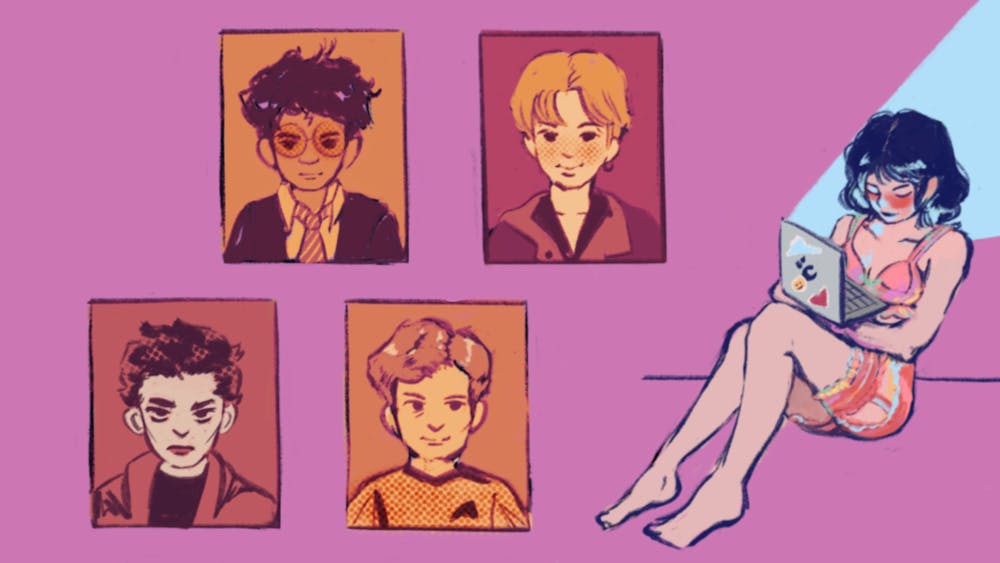If you’ve ever found yourself involved in any sort of fanbase, you’ve probably stumbled upon fanfiction. Maybe you were unhappy with the last season of Game of Thrones, so you searched for an alternate ending. Perhaps you’ve scoured the Internet for a blossoming romance between Harry Potter and Draco Malfoy and devoutly followed their (non–canon) journey from enemies to lovers. While many may grow out of their Harry Potter or Game of Thrones obsessions, fanfiction remains a fundamental part of fan communities, or “fandoms,” of all kinds.
As any new media becomes popular, it is almost certain that fans will produce fanfiction—works of amateur fiction that borrow the characters, settings, and concepts of existing media— to go along with it.
In the last 15 years, fanfiction has gone from fringe and eccentric to almost mainstream. Still, the genre has often been stigmatized for its focus on romance and erotica. Yet these criticized tenets can also provide unique representation for female and queer sexuality. Fanfiction is mostly written by women and often centers queer characters, so women’s sexuality and queer identities are articulated louder in fanfiction spaces than in mainstream media.
Francesca Coppa, a former Wolf Professor of Television Studies at Penn and current chair of the English Department at Muhlenberg College, recognizes this role: “I teach film studies, and we talk about the male gaze… and the way in which mainstream culture, even when it’s not trying to, has a very, kind of, objectifying and male–centric notion of gender and sexuality. And [fanfiction], because it comes from a kind of female–dominated community, doesn’t. It’s different. And it freaks people out.” While fanfiction provides a place for these communities to share their work, that may also be a reason why it is an unsettling topic for many people. In this genre, themes of consent, kink, sex, and relationships are explored in a space away from the male gaze of mainstream media.
In addition to its suggestive reputation, at that time, fanfiction lacked credibility as a form of literature. Fanfiction writers could easily come under attack for stealing material, both in an artistic sense and in a legal framework. Yet, Coppa recognizes that fanfiction is original, transformative work: “The phrase 'transformative works,' it makes my heart happy every time I see it [...] It’s like, of course you didn’t steal. You just wrote 100,000 words, right? You did all the work and you wrote a whole novel.”
Either way, the collaborative and amateur nature of fanfiction is a refreshing break from the modern ideas of publishing companies and copyright infringements. As an English professor, Coppa teaches fanfiction alongside other retellings of stories, like "Beowulf" or Sherlock Holmes. In this way, fanfiction resembles older forms of storytelling and creativity, where stories are retold and remixed over time. People have reproduced Hamlet and retold Romeo and Juliet countless times—even Shakespeare himself didn’t write those plots from scratch. Why shouldn’t we do that with Star Trek?
The rise of the internet is obviously connected to the larger growth of the fanfiction community. As the world wide web became commercialized in the early 2000s, the fanfic community needed a platform—specifically one where readers and writers could be protected from copyright–related legal action and censorship. In 2007, Coppa joined a group of volunteers to start a nonprofit called the Organization for Transformative Works (OTW), which works on projects for a community–focused space of amateur writers, far from the dangers of commercialization.
OTW’s main project is Archive of Our Own (AO3), a public online archive for fanfiction and other fanworks. The website is very purposefully described as an archive—it’s not social media or an online community, but instead a space for storytelling. As a way of encouraging creativity amidst the stigmatization of fanfiction, OTW allows for anonymous contribution. Unlike social media or online communities, there are no incessant email reminders to finish a story or recommendations for new posts. There’s no product marketing or advertisement.
Additionally, the stories don’t have a short lifetime like posts on social media do. “We're seeing a lot of this as people come over from Instagram or Twitter where they think, like, will people think I'm creepy to comment on a Star Trek story that was written in 1992?" Coppa says. "And the answer is no, no more creepy than it would be if you went to a library and took out a novel written in 1860.” Since its creation in 2008, AO3 has become the 56th most–visited website in the United States—and the most–visited arts and entertainment site, above Disney Plus, Hulu, and HBO Max.
Amidst the commercialization of mainstream media, AO3 is a unique reminder of the importance of community storytelling, accessible libraries, and sharing ideas. Fanfiction is a unique opportunity for readers to claim agency over the stories they hear and share their ideas with a larger community. So take this as permission to finally finish that BTS fanfiction you were reading, without any shame or stigma.

